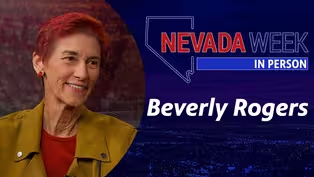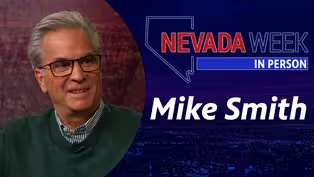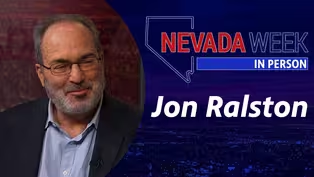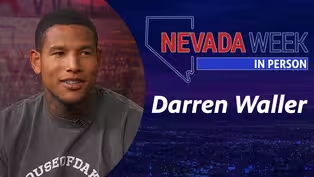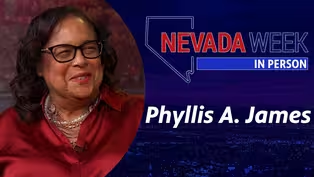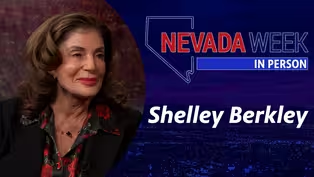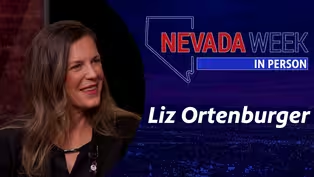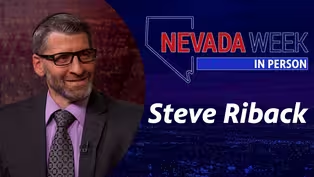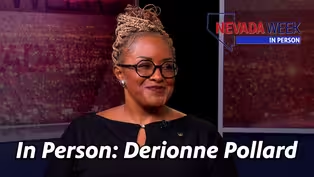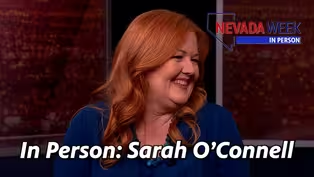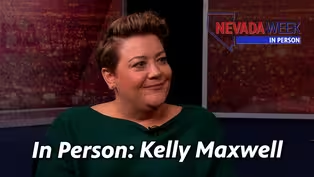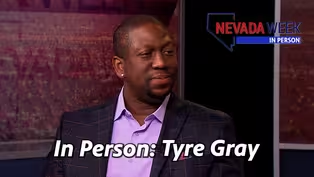
Nevada Week In Person | David Damore
Season 1 Episode 48 | 14mVideo has Closed Captions
One-on-one interview with Chair of the Department of Political Science at UNLV David Damor
One-on-one interview with Chair of the Department of Political Science at UNLV David Damore.
Problems playing video? | Closed Captioning Feedback
Problems playing video? | Closed Captioning Feedback
Nevada Week In Person is a local public television program presented by Vegas PBS

Nevada Week In Person | David Damore
Season 1 Episode 48 | 14mVideo has Closed Captions
One-on-one interview with Chair of the Department of Political Science at UNLV David Damore.
Problems playing video? | Closed Captioning Feedback
How to Watch Nevada Week In Person
Nevada Week In Person is available to stream on pbs.org and the free PBS App, available on iPhone, Apple TV, Android TV, Android smartphones, Amazon Fire TV, Amazon Fire Tablet, Roku, Samsung Smart TV, and Vizio.
Providing Support for PBS.org
Learn Moreabout PBS online sponsorshipMore from This Collection
Nevada Week In Person goes beyond the roundtable discussion of Nevada Week with guests for a more casual conversation about their personal passions, new projects and compelling stories that are overlooked in the flurry of the news cycle.
Nevada Week In Person | Beverly Rogers
Video has Closed Captions
One-on-one interview with Rogers Foundation chair Beverly Rogers. (14m)
Nevada Week In Person | Mike Smith
Video has Closed Captions
One-on-one interview with Las Vegas Sun political cartoonist Mike Smith. (14m)
Nevada Week In Person | Jon Ralston
Video has Closed Captions
One-on-one interview with The Nevada Independent CEO Jon Ralston. (14m)
Nevada Week In Person | Darren Waller
Video has Closed Captions
One-on-one interview with Las Vegas Raider tight end Darren Waller. (14m)
Nevada Week In Person | Phyllis A. James
Video has Closed Captions
One-on-one interview Phyllis A. James. (14m)
Nevada Week In Person | Shelley Berkley
Video has Closed Captions
One-on-one interview Senior Vice President for Touro University Shelley Berkley. (14m)
Nevada Week In Person | Liz Ortenburger
Video has Closed Captions
One-on-one interview with SafeNest CEO Liz Ortenburger. (14m)
Nevada Week In Person | Steve Riback
Video has Closed Captions
One-on-one interview with Las Vegas Metro Police Lieutenant Steve Riback. (14m)
Nevada Week In Person | DeRionne Pollard
Video has Closed Captions
One-on-one interview Nevada State College President DeRionne Pollard. (14m)
Nevada Week In Person | Sarah O’Connell
Video has Closed Captions
One-on-one interview with Director of Eat More Art LLC Sarah O’Connell. (14m)
Nevada Week In Person | Kelly Maxwell
Video has Closed Captions
One-on-one interview with Baby’s Bounty Executive Director Kelly Maxwell. (14m)
Nevada Week In Person | Tyre Gray
Video has Closed Captions
One-on-one interview with Nevada Mining Association President Tyre Gray. (14m 1s)
Providing Support for PBS.org
Learn Moreabout PBS online sponsorshipA political expert whose work focuses on crucial issues facing Nevada and the country, David Damore, Interim Executive Director of the Lincy Institute and Brookings Mountain West, joins us this week for Nevada Week In Person .
♪♪♪ Support for Nevada Week In Person is provided by Senator William H. Hernstadt.
-Welcome to Nevada Week In Person .
I'm Amber Renee Dixon.
Having written extensively on Nevada politics and policy, he is a go-to source for local, national, and international news outlets, especially during election season.
In addition to overseeing two public policy research centers at UNLV, he's also a political science professor and chair of the Department of Political Science at UNLV.
David Damore, thank you for being on Nevada Week In Person.
-Thanks for having me.
-So election night, I'm sitting around my house 8 p.m., flipping through network coverage of the election, and it's Nevada and Alaska with no results to report.
And I'm thinking, it was Friday when early voting ended.
Why wasn't there anything to report?
-(David Damore) Well, you had the polls closing very late, right?
So that's, you know, the rule under the law in Nevada is we can't even start looking at the ballots until the last poll closes.
And that was a very late one up at the UNR campus, so that further-- And then, you know, we have so much mail now.
And that takes much, much longer to process.
So, you know, the downside is, yeah, a lot of interest in it and a lot of frustration with the release of the results, but that's our process now.
-And Nevada has got this reputation now as a mail-in ballot state.
It's gonna take long in Nevada.
What do you think about the mail-in ballot process here and its utilization in the state?
-Well, I mean, any opportunity to get more people to vote, I think is a plus.
We're following-- We're not the first state to do this.
You have other states that have been doing it for a while.
We're just now sort of getting up to speed on it.
So that's certainly there.
But what I think is obviously interesting is the partisan dynamic involved in this, right, that the Democrats are much more likely to use mail balloting.
We saw that in 2020, it's carried forward in 2022.
Republicans, much more likely to vote in person, particularly on Election Day.
So now we're polarizing on how we even cast our votes.
-And this used to not be an issue?
-Well, it used to be much easier, right?
I mean, so much with the vote was in an early voting.
You had a pretty good idea where the party stood at that point, much smaller Election Day turnout, and then, you know, we often by the end of the day know because we had very little mail, very little provisional voting to count there.
That's now shifted.
-And in addition to what you just talked about with partisan aspect to the mail-in voting, what else intrigues you about Nevada politics?
-Well, the part that is so interesting is the electorate here is always turning, right?
Because of our population growth, because of the changing demography, you really know don't know what the election is going to look like from one cycle to the next.
We saw this during COVID: so many Southern Californians moving into Southern Nevada, Northern California was moving into Reno.
What was that going to do to the balance of power there?
Clearly the rise in nonpartisans, that's a big issue in Nevada.
And of course across the West, we're seeing that as well here.
So the electorate here is always reinventing itself.
-And so it keeps you busy?
-It keeps busy trying to keep up with the demographic change.
And you see from cycle to cycle, the action/reaction, right?
So the Democrats had a strong part early in the decade.
2020 COVID, not as much GOTV that they were doing.
And then Republicans really stepped into that space.
You saw Clark go a little more Republican that time around here.
But then up in Washoe, right, it goes a little more blue.
So it's very interesting to watch the state dynamic.
The only constant is the rural part of the state that votes above its population share and overwhelmingly Republican.
-The book that you coauthored on that topic, the difference between rural and urban voting, what did you learn from that?
-Well, so the Blue Metros, Red States is a book that we did looking obviously at the partisan dimension of that, as well as the policymaking dimensions of that and looking at sort of the tension and we'd look at 13 swing states in all the big million-plus metros in there.
And the dynamics of every state is a little bit different.
One of the fun parts of that book is we got to interview experts in each of their states to get a little sense of the history and how we got there.
And you see some states, you know, particularly where the state capitol is located in the biggest city, they tend to do much better in terms of policymaking.
Whereas, a state like Nevada, where we have this sort of distant, remote state government-- not a lot of local government authority here, a lot of fragmentation here --we see policymaking is not so cohesive.
So that was sort of what we were looking at and obviously looking at that sort of balance of power for, Can we find that space, that geographic space, where it tips one state to the other?
And obviously what you're seeing, one of the things that we found in the book, in this sort of projecting to 2020, was every state where one metro region counts for more than half of the state's population, Joe Biden won them.
So it flips Arizona because of Maricopa, flipped Georgia because of Atlanta.
So you see this sort of metro cohesion; whereas, in a state like Florida, fragmented with, you know-- In Texas, same way.
Even in Ohio it's much more fragmented.
You see much less cohesion within the metro.
So it's going to tease out of that sort of is that an artifact, or is that something important there?
And even saw this, I think looking at the Georgia races, right, in the suburbs there voting for Kemp for governor, a lot of defection to Warnock in those races.
-How long have you been in Nevada now?
-Twenty-two years.
-All right, coming from?
-California, Northern California.
-Okay, and that is where-- Well, University of California, Davis, you got your PhD; MA from the University of Georgia; BA from the University of California, San Diego.
All in political science.
How and when did you get interested in politics?
I'm thinking there was maybe a race when you were a little boy that-- -It was my grandfather to tell you the truth.
-Yeah?
Okay.
-I grew up in Modesto, California.
He was in Sacramento.
He was involved in local government there.
Diehard Roosevelt Democrat, but really got me interested in politics and history, and he really hated Nixon.
And so the first books I read were all the Watergate books.
During high school, I was like the nerd reading the Watergate books.
And I figured, you know, I'll go to law school.
My older brother went to law school, and I said I don't want to go to law school.
So then I really got to, I can do this.
And I liked the idea of being a fact professor doing research, working with data.
And here I am.
-What was it about law school that turned you off?
-No so much law school, but the life of a lawyer.
You know, the constant billing, you're not getting to choose your cases, to sort of the grind of being a day-to-day lawyer did not seem that appealing.
-In October of last year, you took on the Interim Executive Director of two public policy research centers at UNLV, the Lincy Institute and Brookings Mountain West.
That was following the passing of the revered Robert Lang, who held that executive director role prior to his passing in June 2021 due to cancer.
You worked together on a lot.
What is his legacy in this state?
-Oh, tremendous.
I mean, I had the privilege to work with Rob for a decade and just watch him.
He came in here, coming out of the Great Recession, Southern Nevada, was kind of looking around, What's next?
Are we going to keep trying to do the same thing over and over?
And, you know, he brought that national perspective coming from back East, sort of saying, This is what you need to do.
The first thing they did was the economic development plan.
Restructured economic development, figured out where we can compete for new business, and most importantly, found out what assets we were missing in this region.
Things like Allegiant Stadium, the connection Interstate 11 to Phoenix, R1 institution, a medical school, all those sorts of lists that he came in and, These are things that we need to build.
And then watching and working with him that last decade is when I realized that vision.
-When you talk about the Great Recession and the need to diversify the Las Vegas economy away from gaming and tourism because of such reliance on it, was he really the first to introduce that concept?
-Not really, but he was the first to bring some metrics to it.
You know, it's easy to say we need to do this, we need to do this, but to make the comparisons, Why are we getting our clock cleaned by Phoenix?
Why can't we compete with Salt Lake City?
What are the advantages being so proximate to California?
And really sort of identifying those sort of assets that we just did not have for a city this big.
And that was a really, really big part of it there, figuring out where we compete, even in gaming and in tourism.
How can we sort of expand that into sports?
So one of the big voices for Allegiant Stadium.
A lot of people said, No, that's just a boondoggle, but I don't think anybody thinks that was a dumb idea now.
We've become an NFL team, right, to have the capacity to host large events on the strip.
For our perspective, there's also a way that we can invest our own Southern Nevada resources into an asset that would essentially help us build our economy.
-What have you found to be the most pressing issue of Nevada right now through your research?
-Oh, governance.
I mean, we still govern like we're 1800s here.
I mean, it's ridiculous.
You know, you look at a legislature that meets every two years, 120 days.
Okay, if you want that, then you probably should have some local government power.
We have neither, right?
So that sort of tensions, right?
We've been advocates for higher ed governance reform for a long time.
-How do we not have local power?
-You know, it's a great question.
Some of it is, you know, it always comes to the capacity to actually make these changes, right, because all of it has to come.
You know, a lot of it's in the constitution, right?
So changing the constitution here is not easy.
And then, you know, there's a lot of the people who control that process control the status quo.
They don't want to change it, right?
So I've gone up there to Carson City to talk to legislators, and they're like, Well, you know, we're kind of a weak branch.
And we have-- One of the powers we do have is over local governments, so we don't want to give that up.
But it puts us at a real competitive disadvantage.
We're not nimble.
Our local governments have to wait two years to get their bills heard.
It's a very tough structure there.
You look at the county based school district, right?
There's a lot -- It may work with the rest in Nevada.
Probably isn't a great model for Southern Nevada.
People are finally sort of getting that.
The nice thing-- -Because it's just too big?
-It's just too big, right.
You have the core of Las Vegas-- Moapa Valley, Mesquite, Boulder City --all one school district?
Think about it.
We're like the 28th largest metro, and we're the fifth biggest school district.
There's some sort of mismatch in there.
So we're, you know-- And what we do find is when we do reform, it seems to work out well.
Economic development, and I don't think anyone wants to go back to the old model, right?
This idea of a medical school in Southern Nevada was seen as ridiculous and preposterous by some of the folks up north, but I don't think anybody thinks it's a dumb idea now.
Imagine what we would have been like during COVID without our medical school.
-And that was another-- -That was a great-- Yeah, that was one of Rob's big initiatives.
And that comes from the Kerkorian Estate, right?
Kirk Kerkorian's estate funds Lincy.
They want healthcare fixed in Southern Nevada, and that's why their name is on the building.
-Do you find some of what you are proposing gets that feedback of, No, you're crazy?
-Less so now because I think people realize, you know, we've kind of grown up a little bit since the Great Recession a little bit I'd like to think.
You have sort of a transition in leadership, new people coming on who are less tied to sort of the old ways of doing things there.
So I don't think there's a resistance.
I think everybody sees like the Las Vegas Medical District, Well, that seems like a no-brainer.
Las Vegas tried to create that decades ago, and now it's finally getting that momentum.
So I think people sort of see that.
You're seeing, I think, people are really frustrated with Clark County School District.
You know, one of the things I noticed in the data is that there are only two-thirds of all the public school students.
We should be-- If everybody was enrolled, that would be over 75% of the state.
So people are leaving with their feet.
They're going to privates.
They're going to charters.
They're going to homeschooling there.
So there's a lot of frustration with these structures.
-In your personal life, I have heard about the idea that your political leanings will change as you age or if there's a life event, like you get married or you have a kid.
Have you found that to be the case in your life?
-A little bit.
I would say I've just become much more geographically focused.
Rob, if that was Rob, because he was a big geography person, an economic geographer.
And I never was much more of a temporal time series type of person looking at how things unfold dynamically.
But I really look at politics now through the lens of where I live, right?
And so, you know, I vote south, right?
And so partisanship complicates geographic voting.
And it's an interesting puzzle to try to unlock.
-Can you further explain that?
In 30 seconds, because we're getting-- -Yes.
I mean parties are the organizing principle of American politics here.
But you know, politicians represent specific spaces on the map.
And one of the reasons that we struggle in Southern Nevada compared to, say, Northern Nevada is our politics are less cohesive.
So thinking about ways, like things like the Southern Nevada Forum, for example, was a creation to try to get people to think regionally here.
Southern Nevada also goes to the governance problem and very fragmented governments in Southern Nevada.
A lot of competition, less collaboration.
-David Damore, I gotta cut you off there.
Thank you so much for your time.
And thank you for joining us for Nevada Week In Person .
To see more, as well as this week's edition of Nevada Week go to vegaspbs.org/nevadaweek.
♪♪♪

- News and Public Affairs

Top journalists deliver compelling original analysis of the hour's headlines.

- News and Public Affairs

FRONTLINE is investigative journalism that questions, explains and changes our world.












Support for PBS provided by:
Nevada Week In Person is a local public television program presented by Vegas PBS
